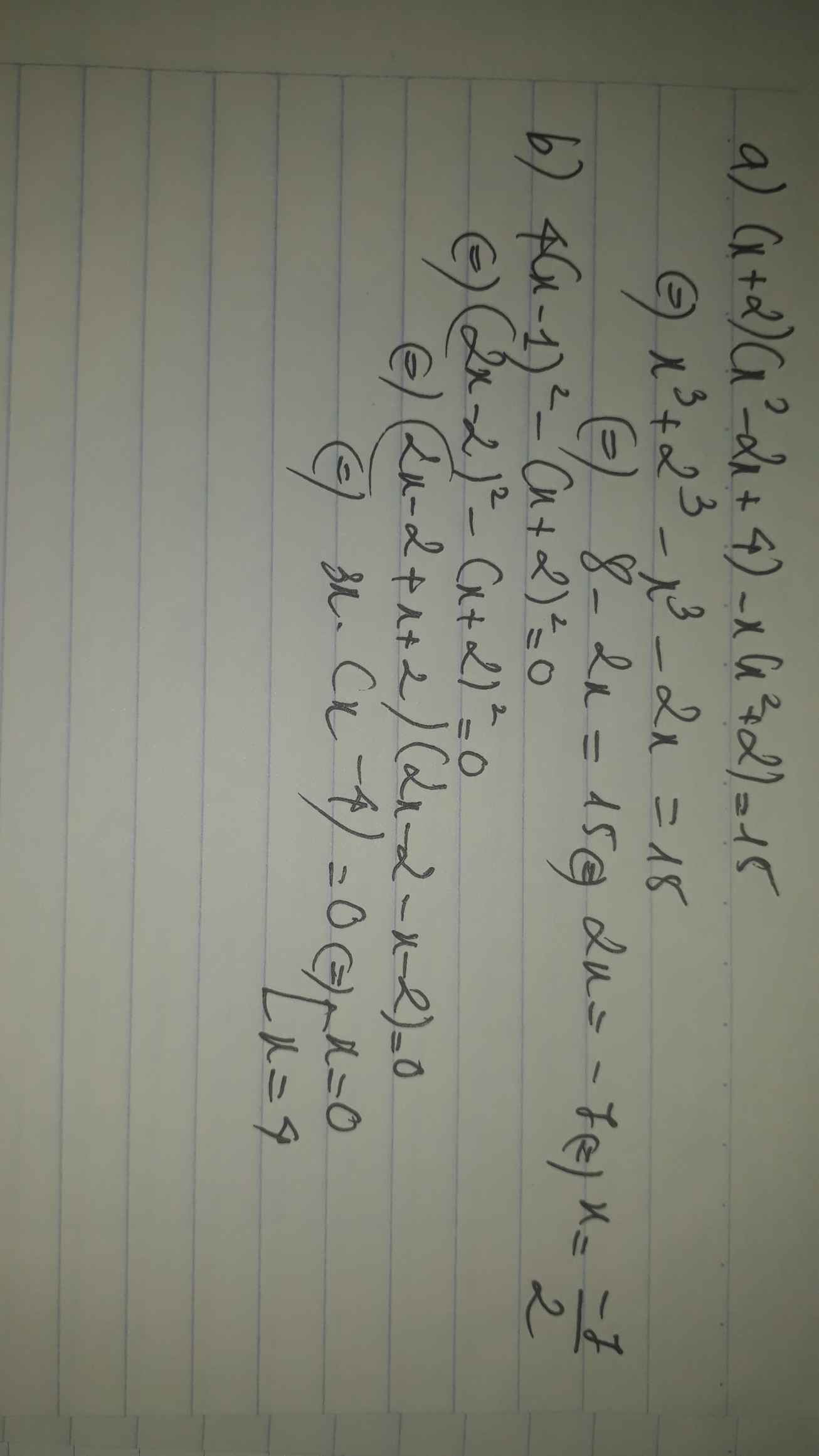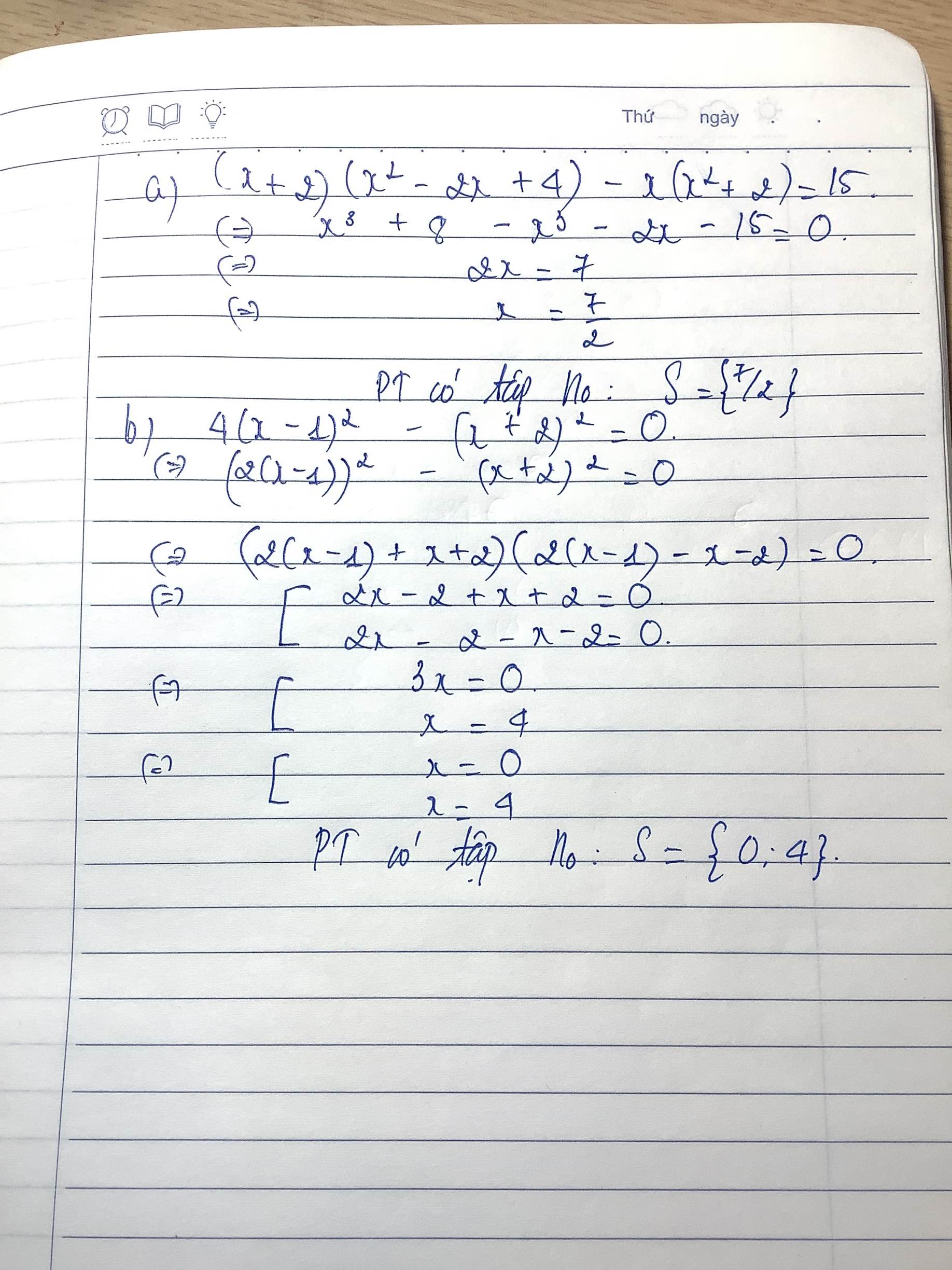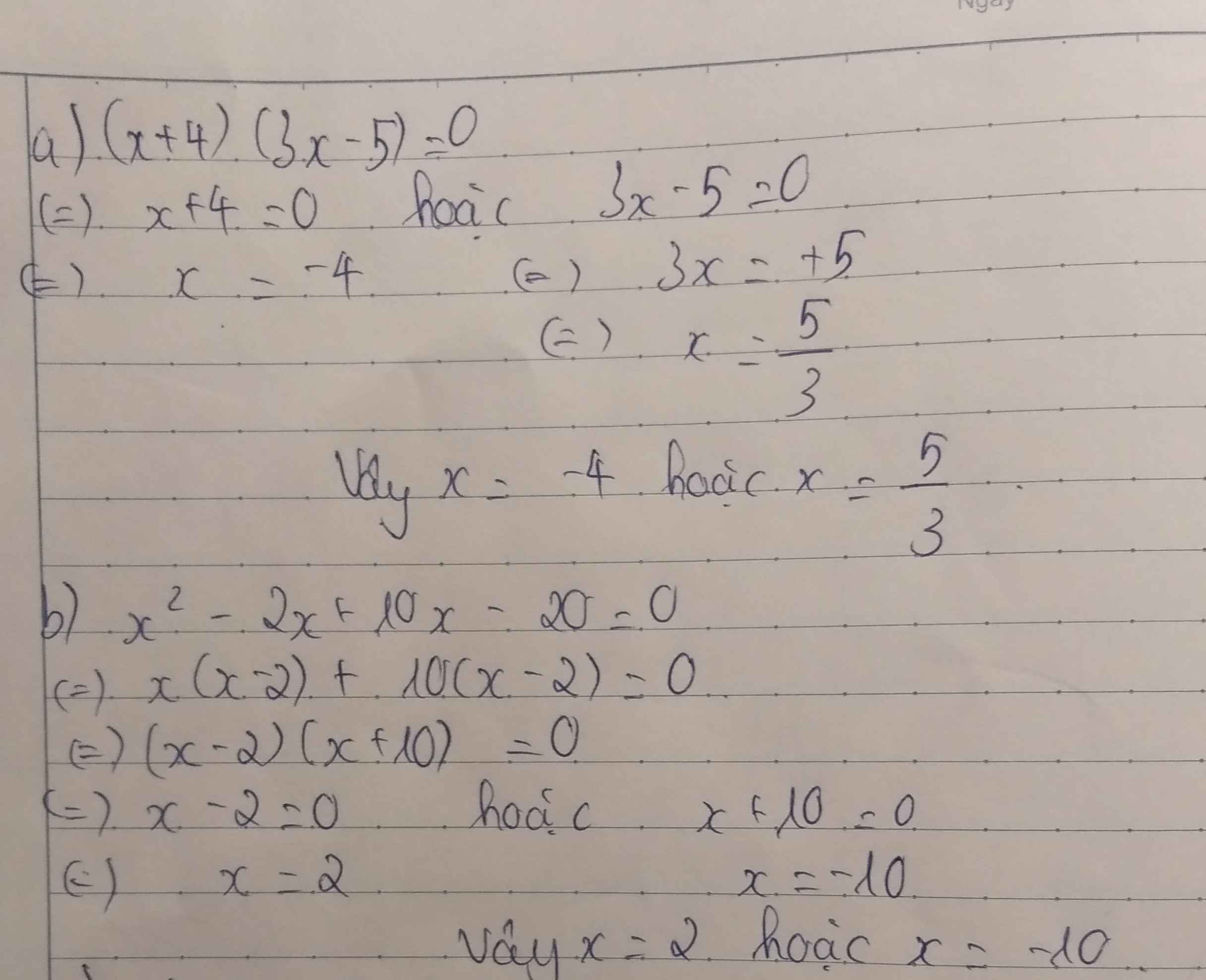
Hãy nhập câu hỏi của bạn vào đây, nếu là tài khoản VIP, bạn sẽ được ưu tiên trả lời.


Ta có: \(\left(1-x\right)^2+\left(x-x^2\right)+3=0\)
\(\Leftrightarrow x^2-2x+1+x-x^2+3=0\)
\(\Leftrightarrow4-x=0\)
hay x=4
Vậy: S={4}
$⇔x^2-2x+1+x-x^2+3=0$
$⇔-x=-4$
$⇔x=4$
Vậy phương trình đã cho có tập nghiệm S={4}

\(A=x^3-2x+n\)
\(B=n-2\)
\(A\text{⋮}B\) ⇒ \(\left(x^3-2x+n\right)\text{⋮}\left(n-2\right)\)
⇒ \(\left[\left(x^3-2x^2\right)+\left(2x^2-4x\right)+\left(2x-4\right)+\left(n+4\right)\right]\text{⋮}\left(n-2\right)\)
⇒ \(\left[x^2\left(x-2\right)+2x\left(x-2\right)+2\left(x-2\right)+\left(n+4\right)\right]\text{⋮}\left(n-2\right)\)
⇒ \(\left[\left(x-2\right)\left(x^2+2x+2\right)+\left(n+4\right)\right]\text{⋮}\left(x-2\right)\)
Vì \(\left(x-2\right)\left(x^2+2x+2\right)\text{⋮}\left(n-2\right)\)
Để \(A\text{⋮}B\)
⇒ \(n+4=0\)
⇒ \(n=-4\)

a. \(x^2-25-3.\left(x-5\right)=0\\ \Leftrightarrow\left(x-5\right)\left(x+5\right)-3.\left(x-5\right)=0\\ \Leftrightarrow\left(x-5\right)\left(x+5-3\right)=0\\ \Leftrightarrow\left[{}\begin{matrix}x-5=0\\x+2=0\end{matrix}\right.\Leftrightarrow\left[{}\begin{matrix}x=5\\x=-2\end{matrix}\right.\)
b. \(\left(3x+1\right)^2=\left(2x-5\right)\\ \Leftrightarrow9x^2+6x+1=2x-5\\ \Leftrightarrow9x^2+6x-2x=-5-1\\ \Leftrightarrow9x^2+4x=-6\\ \Leftrightarrow x\left(9x+4\right)=-6\\ \Leftrightarrow\left[{}\begin{matrix}x=-6\\9x+4=-6\end{matrix}\right.\Leftrightarrow\left[{}\begin{matrix}x=-6\\x=-\dfrac{10}{9}\end{matrix}\right.\)
c. \(2x^2-7x+6=0\\ \Leftrightarrow2x^2-7x=-6\\ \Leftrightarrow x\left(2x-7\right)=-6\\ \Leftrightarrow\left[{}\begin{matrix}x=-6\\x=\dfrac{1}{2}\end{matrix}\right.\)
a, \(\left(x-5\right)\left(x+5\right)-3\left(x-5\right)=0\Leftrightarrow\left(x-5\right)\left(x+2\right)=0\Leftrightarrow x=-2;x=5\)
b, bạn ktra lại đề, thường thường ngta hay cho 2 vế cùng bình phương
c, \(2x^2-7x+6=0\Leftrightarrow\left(2x-3\right)\left(x-2\right)=0\Leftrightarrow x=\dfrac{3}{2};x=2\)


\(x^2-4x+3=0\\ \Rightarrow\left(x^2-3x\right)-\left(x-3\right)=0\\ \Rightarrow x\left(x-3\right)-\left(x-3\right)=0\\ \Rightarrow\left(x-1\right)\left(x-3\right)=0\\ \Rightarrow\left[{}\begin{matrix}x=1\\x=3\end{matrix}\right.\)

\(a,\Leftrightarrow x^2-2x-x^2+5x=6\\ \Leftrightarrow3x=6\\ \Leftrightarrow x=2\)
\(b,\Leftrightarrow x^2-6x+9-x+9=0\\ \Leftrightarrow x^2-7x+18=0\\ \Leftrightarrow\left(x^2-7x+\dfrac{49}{4}\right)+\dfrac{23}{4}=0\\ \Leftrightarrow\left(x-\dfrac{7}{2}\right)^2+\dfrac{23}{4}=0\left(vôlí\right)\)

\(2\left(x^2-x\right)-x\left(x+2\right)+4=0\)
\(\Leftrightarrow2x^2-2x-x^2-2x+4=0\)
\(\Leftrightarrow x^2-4x+4=0\)
\(\Leftrightarrow\left(x-2\right)^2=0\)
\(\Leftrightarrow x-2=0\)
\(\Leftrightarrow x=2\)
Vậy \(S=\left\{2\right\}\)

a. \(x^4-16=0\\ \Leftrightarrow\left(x^2-4\right)\left(x^2+4\right)=0\)
\(\Leftrightarrow\left(x-2\right)\left(x+2\right)\left(x^2+4\right)=0\)
\(\Leftrightarrow\left[{}\begin{matrix}x=2\\x=-2\end{matrix}\right.\)
b. \(x^2-9x+8=0\\ \Leftrightarrow x^2-x-8x+8=0\\ \Leftrightarrow x\left(x-1\right)-8\left(x-1\right)=0\\ \Leftrightarrow\left(x-1\right)\left(x-8\right)=0\\ \Leftrightarrow\left[{}\begin{matrix}x=1\\x=8\end{matrix}\right.\)


\(a,\Rightarrow\left(x-2000\right)\left(5x-1\right)=0\Rightarrow\left[{}\begin{matrix}x=2000\\x=\dfrac{1}{5}\end{matrix}\right.\\ b,\Rightarrow x\left(x^2-13\right)=0\Rightarrow\left[{}\begin{matrix}x=0\\x=\sqrt{13}\\x=-\sqrt{13}\end{matrix}\right.\\ c,\Rightarrow3x\left(x-2\right)=0\Rightarrow\left[{}\begin{matrix}x=0\\x=2\end{matrix}\right.\\ d,\Rightarrow\left(x-5\right)\left(x+3\right)=0\Rightarrow\left[{}\begin{matrix}x=5\\x=-3\end{matrix}\right.\\ e,\Rightarrow\left(3x-2\right)\left(3x+2\right)=0\Rightarrow\left[{}\begin{matrix}x=\dfrac{2}{3}\\x=-\dfrac{2}{3}\end{matrix}\right.\)



\(\frac{x^2-x-6}{x-3}=0\)
\(\frac{\left(x+2\right)\left(x-3\right)}{x-3}=0\)
\(x+2=0\)
\(x=-2\)
\(\frac{x^2-x-6}{x-3}=0\) đkxđ \(x\ne3\)
\(\Leftrightarrow\frac{\left(x+2\right)\left(x-3\right)}{x-3}=0\)
\(\Leftrightarrow x+2=0\)
\(\Leftrightarrow x=-2\left(tm\right)\)